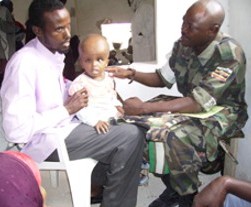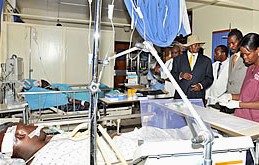|
East Africa | Somalia Politics Al Shabaab internationalises Somali terror
Contrary to many news reports, this is not Al Shabaab's first attack outside its Somali power base. The increasingly extremist Islamist group has been involved in the killing of aid workers in independent but unrecognised Somaliland and is reported to have participated in attacks on government forces in Ethiopia's Ogaden region.
There are talks of Al Shabaab wanting to become a regional Al Qaeda member group as the more extreme leaders within Somalia's armed Islamists have gained the upper hand in the organisation. Foreign Arab influence is visibly on the increase in Al Shabaab, which also the Al Qaeda-style Kampala terrorist attack is proof of. Al Qaeda seemingly wants to use Al Shabaab to transform East Africa into yet another front in its global terror campaign. Its attempt to take root in the Maghreb and Sahel so far seems to have failed, making Al Shabaab's cooperation a welcome return to Africa for Al Qaeda. But the extremist movements' attempt to gain a foothold outside Somalia will not be easy. Kenya and Tanzania have been fairly successful in rooting out Al Qaeda groups from their territories after terror attacks in the 1990s and will use their experience to hinder Al Shabaab from re-establishing in the region. Uganda and Burundi, being able to draw upon help from their East African Community neighbours Kenya and Tanzania, are heavily militarised countries with a tradition of intelligence services and anti-terror operations. Even neighbouring Ethiopia and Somaliland have been successful in reducing Somali extremist activities on their territories, almost eliminating their influence. And Al Shabaab cannot count on much regional support anymore. In Sudan, a country that had contacts with Al Qaeda in the 1990s, government is by now strongly repressing any extremist groups. Even Eritrea, which provided Al Shabaab with arms to help fighting the common enemy Ethiopia, is now reconsidering its stands on the Somali Islamists. For the African Union (AU), this attempt by Al Shabaab to internationalise its terror war has only served as a reminder that the Islamist group must be defeated in Somalia. "This tragic event will strengthen the collective determination of Africa to play its part in the struggle waged by the international community to stamp out the phenomenon of terrorism," asserted AU Commission leader Jean Ping today. By staff writers © afrol News - Create an e-mail alert for East Africa news - Create an e-mail alert for Somalia news - Create an e-mail alert for Politics news
On the Afrol News front page now
|
front page
| news
| countries
| archive
| currencies
| news alerts login
| about afrol News
| contact
| advertise
| español
©
afrol News.
Reproducing or buying afrol News' articles.
You can contact us at mail@afrol.com









